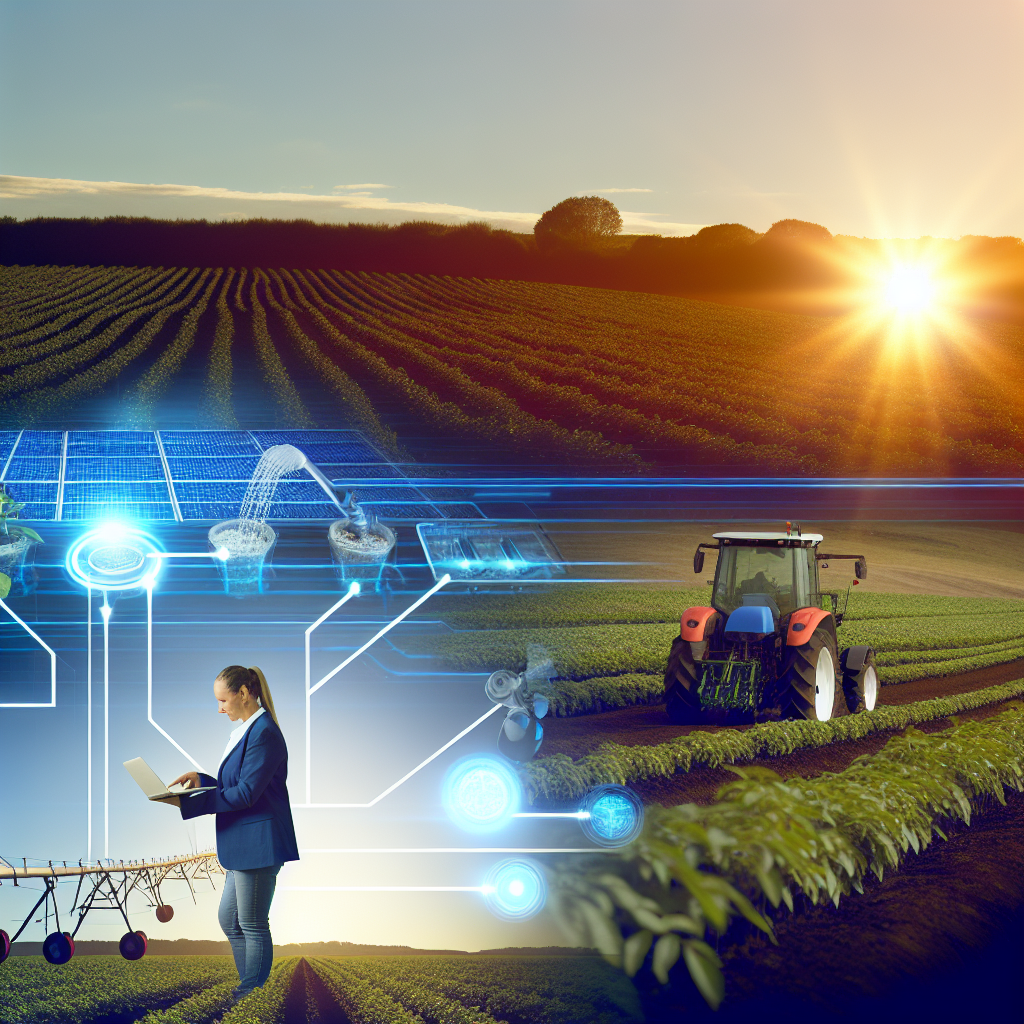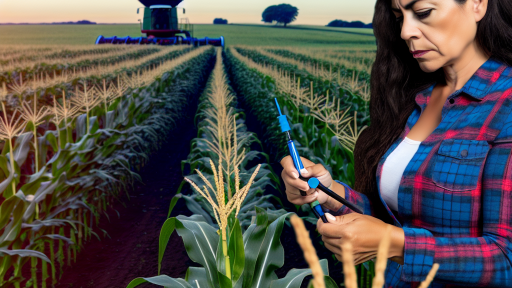Introduction to Automated Machinery in Farming
Automated machinery revolutionizes modern farming practices.
This technology enhances efficiency and productivity significantly.
Farmers now utilize advanced tools to optimize operations.
As a result, they see reduced labor costs and increased yields.
Additionally, automation minimizes human error during critical processes.
This advance leads to higher quality produce and better harvests.
Moreover, automated systems streamline resource management.
These systems monitor water, nutrients, and soil quality effectively.
Consequently, farmers can allocate resources more sustainably.
Precision agriculture exemplifies how machinery enhances farming.
This approach utilizes data to inform decision-making processes.
Farmers can adjust their strategies based on real-time information.
Consequently, crop outputs improve without overusing resources.
Automation also aids in reducing the carbon footprint of agriculture.
With electric machinery, emissions decrease substantially.
Transform Your Agribusiness
Unlock your farm's potential with expert advice tailored to your needs. Get actionable steps that drive real results.
Get StartedThis shift aligns farming practices with sustainable development goals.
In addition, automated machinery can be tailored to specific crops.
This customization enhances operational efficiency and effectiveness.
Overall, automated machinery plays a vital role in the future of farming.
Benefits of Automation in Sustainable Farming Practices
Increased Efficiency
Automation significantly enhances farming efficiency.
Farmers can process crops faster than ever before.
Additionally, tasks such as planting and harvesting become quicker.
This efficiency reduces labor costs and increases productivity.
Resource Conservation
Automated machinery optimizes resource usage.
Farmers utilize water, fertilizers, and pesticides more judiciously.
This leads to decreased waste and enhanced sustainability.
Moreover, minimal resource usage lowers the environmental footprint.
Improved Crop Monitoring
Automation allows for real-time monitoring of crops.
Farmers can detect issues like pests and diseases early.
This timely intervention enhances crop health and yields.
Furthermore, drones can monitor large fields efficiently.
Data-Driven Decision Making
Automated systems gather extensive data from the fields.
Farmers can analyze this data to refine their strategies.
Accurate data informs decisions on planting and harvesting times.
As a result, farmers achieve better outcomes.
Enhanced Labor Management
Automation reduces the dependence on manual labor.
Farmers can effectively manage staff resources.
This shift allows labor to focus on more strategic tasks.
Ultimately, it leads to a more motivated workforce.
Showcase Your Farming Business
Publish your professional farming services profile on our blog for a one-time fee of $200 and reach a dedicated audience of farmers and agribusiness owners.
Publish Your ProfileTypes of Automated Machinery Used in Modern Agriculture
Precision Agriculture Equipment
Precision agriculture equipment enhances farming efficiency through data-driven practices.
These devices utilize GPS and sensors to improve field mapping.
Farmers can optimize resource usage, leading to increased yields.
Common tools include variable rate applicators and soil moisture sensors.
Automated Planting Machines
Automated planting machines simplify the sowing process.
They ensure consistent planting depth and spacing for crops.
Farmers can reduce labor costs and time spent on planting.
Many models can adapt to variable field conditions seamlessly.
Robotic Harvesters
Robotic harvesters are revolutionizing the harvesting process.
These machines can work around the clock to pick ripe fruits and vegetables.
They minimize human error and reduce crop damage during harvesting.
Examples include automated strawberry pickers and apple harvesters.
Crop Monitoring Drones
Crop monitoring drones provide aerial views of agricultural land.
They capture detailed images to assess crop health effectively.
Farmers can make informed decisions based on real-time data.
Drones also help identify issues like pests and nutrient deficiencies.
Livestock Management Systems
Automated livestock management systems streamline animal monitoring.
These systems track animal health and behavior using sensors.
Farmers receive alerts about potential health issues quickly.
This technology enhances overall herd management and productivity.
Find Out More: How Biotechnology Enhances Nutritional Value Of Crops
Case Studies: Successful Implementation of Automation in Farms
Introduction to Automation in Agriculture
Automation brings significant advancements to modern agriculture.
Farmers harness technology to improve productivity and efficiency.
Moreover, it facilitates sustainable farming practices.
Case Study One: Greenfield Farms
Greenfield Farms implemented robotic systems for harvesting.
This change led to a 30% increase in efficiency.
Additionally, it reduced labor costs significantly.
Robots selectively picked ripe fruits, decreasing waste.
Consequently, this method enhanced overall crop quality.
Case Study Two: EcoGrow Innovations
EcoGrow Innovations adopted automated irrigation systems.
This decision optimized water usage across the farm.
As a result, they achieved a 25% reduction in water consumption.
Furthermore, automation allowed for precise nutrient delivery.
The outcome was healthier crops and better yields.
Case Study Three: Sunny Acres Organic Farm
Sunny Acres introduced drones for crop monitoring.
Drones provided real-time data about crop health.
This approach enabled quicker response to issues.
Farmers could identify pests and diseases earlier.
Consequently, they minimized pesticide use and boosted sustainability.
Case Study Four: Harvest Solutions
Harvest Solutions integrated AI-powered analytics on their farm.
Showcase Your Farming Business
Publish your professional farming services profile on our blog for a one-time fee of $200 and reach a dedicated audience of farmers and agribusiness owners.
Publish Your ProfileThis technology analyzed soil conditions and weather patterns.
Based on this data, they adjusted their planting schedules.
The efficiency improved, and crop rotation became easier.
Ultimately, this led to more sustainable farming practices.
Future Prospects for Automated Farming
Looking ahead, automation will continue evolving in agriculture.
New technologies will enhance efficiencies and sustainability.
Moreover, farmers will leverage data analytics for better decisions.
Thus, the future of farming appears promising and innovative.
You Might Also Like: Choosing The Right Farm Management Software For Your Farming Needs
Challenges and Solutions in Integrating Automated Machinery
Technical Challenges
Integrating automated machinery within farming practices presents several technical challenges.
Farmers often struggle with outdated machinery that lacks compatibility with new technology.
This lack of integration leads to inefficiencies in operations and increased costs.
Moreover, the complexity of operating advanced automated systems can overwhelm staff.
Training must occur to ensure that workers can effectively manage new technology.
Financial Constraints
Many farmers face financial barriers when adopting automated machinery.
The initial investment can be substantial, discouraging potential users.
Consequently, financing options and government grants become crucial for adoption.
Moreover, ongoing maintenance costs can strain tight agricultural budgets.
It’s important for farmers to conduct comprehensive cost-benefit analyses before investing.
Cultural Resistance
Cultural factors can impede the acceptance of automated farming solutions.
Some farmers may hold traditional views, feeling anxious about adopting new methods.
This mindset can limit the exploration of innovative technologies.
Addressing concerns through education and demonstrations can help shift perspectives.
Fostering a culture of innovation within farming communities is vital for progress.
Data Management Issues
Automated systems generate vast amounts of data, presenting management challenges.
Farmers must analyze this data to make informed decisions, which can be daunting.
Utilizing data management software can streamline this process significantly.
Additionally, training on data interpretation remains essential for effective usage.
Collaboration with tech companies can also enhance data processing capabilities.
Environmental Impact Considerations
While automated machinery can increase efficiency, it may have environmental consequences.
Some automated systems can lead to soil degradation if not managed properly.
Farmers must adopt sustainable practices alongside new technologies to mitigate these effects.
Implementing eco-friendly machinery options can reduce the overall environmental footprint.
Moreover, continuous monitoring of environmental impact ensures responsible usage.
Solutions and Best Practices
Addressing these challenges involves proactive solutions and best practices.
Investing in training programs equips staff with necessary skills to operate technology.
Seeking partnerships with tech developers fosters collaboration and innovation.
Exploring grant opportunities can assist in overcoming financial limitations.
Creating community forums encourages sharing of experiences and strategies.
Ultimately, staying informed on emerging technologies ensures farmers maintain a competitive edge.
Showcase Your Farming Business
Publish your professional farming services profile on our blog for a one-time fee of $200 and reach a dedicated audience of farmers and agribusiness owners.
Publish Your ProfileLearn More: Climate Change Mitigation Through Agricultural Biotechnology

Impact of Automated Machinery on Crop Yield and Quality
Overview of Automated Machinery in Farming
Automated machinery significantly transforms modern farming practices.
Farmers integrate advanced machinery to enhance efficiency.
This technology reduces labor costs and increases output.
Moreover, it assists in maintaining high crop quality.
Increased Crop Yield
Automated systems optimize planting, watering, and harvesting processes.
This efficiency directly boosts overall crop yield.
For instance, precision agriculture techniques demonstrate substantial improvements.
Farmers like Mike Henderson report a 20% increase in yield.
Such advancements help meet growing food demands worldwide.
Improved Crop Quality
Automation enhances consistency in agricultural operations.
Uniformity leads to better-quality crops and produces.
For example, automated irrigation systems deliver precise water amounts.
This careful management reduces the risk of overwatering.
As a result, crops like tomatoes and peppers achieve better flavor profiles.
Resource Efficiency
Automated machinery reduces waste of resources such as water and fertilizer.
Technology allows for targeted applications based on real-time data.
This approach minimizes environmental impacts significantly.
Consequently, farmers can practice sustainable agriculture more effectively.
Labor Force Implications
While automation increases efficiency, it also alters the labor landscape.
Many traditional farming jobs may decline due to machinery implementation.
However, new roles emerge in technological management and maintenance.
Farmers like Sara Lopez adapt by retraining their workforce.
This evolution fosters a blend of technology and skilled labor.
Explore Further: Smart Farming: Leveraging IoT for Sustainable Agriculture
Role of Data Management and IoT in Automated Farming
Introduction to Data Management in Farming
Data management plays a crucial role in modern agriculture.
It provides farmers with insights into soil health and crop conditions.
This information empowers them to make informed decisions.
Importance of the Internet of Things
The Internet of Things (IoT) connects various devices in farming.
Through IoT, sensors collect real-time data from the fields.
This data enhances the precision of farming practices.
Benefits of Integrated Data Systems
Integrated data systems streamline farming operations effectively.
Farmers can track weather patterns and adjust practices accordingly.
Moreover, they can monitor resource use to minimize waste.
Enhancing Crop Management
Data-driven insights help optimize crop management strategies.
Farmers can determine the best planting times and techniques.
Consequently, they achieve higher yields with lower inputs.
Remote Monitoring Capabilities
Remote monitoring allows farmers to observe field conditions from anywhere.
This accessibility leads to timely interventions when needed.
Farmers can address issues like pests and diseases quickly.
Showcase Your Farming Business
Publish your professional farming services profile on our blog for a one-time fee of $200 and reach a dedicated audience of farmers and agribusiness owners.
Publish Your ProfilePromoting Sustainable Practices
Utilizing data management encourages sustainable farming techniques.
Farmers can apply precise amounts of fertilizers and water.
This practice enhances productivity while protecting the environment.
Case Studies of Successful Implementation
Various farms have successfully integrated IoT and data management.
For instance, GreenFields Farm increased efficiency by 30%.
Another example is EcoGrow Farms, which improved yield quality significantly.
Future Prospects of Automated Farming
The future of farming lies in advanced technology and data management.
As IoT technology evolves, its applications in farming will expand.
Furthermore, we can expect even smarter solutions for sustainability.
Future Trends: Innovations in Agricultural Automation for Sustainability
Advancements in Robotics
Robotics technology is rapidly evolving within the agricultural sector.
Innovations include autonomous tractors and drones for planting and monitoring crops.
Moreover, these machines reduce labor costs and increase operational efficiency.
Data-Driven Farming
Data analytics plays a vital role in modern farming techniques.
Farmers utilize sensors to gather real-time information on soil health and weather conditions.
This data allows for precision farming, leading to optimized resource use.
As a result, farmers can reduce waste and enhance crop yields.
Sustainable Water Management
Innovative irrigation systems contribute to sustainable farming practices.
For instance, drip irrigation minimizes water use while maximizing crop output.
Smart irrigation technologies utilize weather data to improve water conservation.
Thus, farmers can significantly reduce their water footprint.
Integrated Pest Management
Automation aids in pest management through the use of smart traps and sensors.
These technologies help identify pest infestations early on.
Consequently, farmers can take action before significant crop damage occurs.
This proactive approach leads to reduced pesticide usage and healthier ecosystems.
Collaboration with AgTech Startups
Collaboration between traditional farms and AgTech startups is on the rise.
These partnerships foster innovation through shared knowledge and resources.
Startups introduce cutting-edge technologies that enhance sustainability efforts.
Ultimately, this synergy paves the way for a more sustainable agricultural future.




